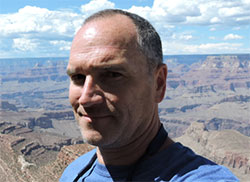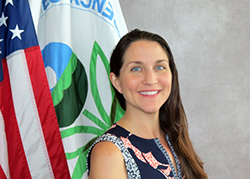Conducting Climate Vulnerability Assessments at Superfund Sites: Lessons Learned
Archived: Tuesday, November 14, 2023
Sponsored by: U.S. EPA Agency's Office of Superfund Remediation and Technology Innovation (OSRTI)
The U.S. Environmental Protection Agency's Office of Superfund Remediation and Technology Innovation (OSRTI) is delivering a webinar summarizing lessons learned in conducting climate vulnerability assessments (CVAs) at sites on the National Priorities List (NPL). The webinar will cover:
- The underlying authorities to consider climate change at NPL sites
- Key questions addressed through the climate vulnerability assessment process
- Tools and data sources used to develop climate projections
- Recurring climate vulnerabilities that could affect remedy protectiveness
- The associated adaptation measures needed to increase remedy resilience to climate impacts
While the CVA process described in this webinar has been applied mostly to sites within the Superfund Program, it is considered "program neutral" and may be used as a guide for developing a CVA process and conducting CVAs at contaminated sites in other cleanup programs.
 Carlos Pachon, U.S. EPA Office of Superfund Remediation and Technology Innovation (pachon.carlos@epa.gov)
Carlos Pachon, U.S. EPA Office of Superfund Remediation and Technology Innovation (pachon.carlos@epa.gov)
Carlos manages EPA's Brownfields and Land Revitalization Technology Support Center which has an overall goal of advancing best practices and new technologies in cleaning up Brownfield sites. The Brownfields Road Map is a product of the BTSC, which in turn is a collaborative effort between the Superfund Program and the Office of Brownfields and Land Revitalization. Carlos has a broad cross-program perspective on innovative practices in site assessment and cleanup, and he generates and manages knowledge and information on the use of technologies in the Superfund Program. He is currently leading a cross-Agency effort to advance EPA's Principles for Green Remediation.
In recent years he has held other positions including Deputy Director for Environmental Reviews with the United States Trade Representative, and as a special assistant to EPA Administrator Johnson. He has a BS from Colorado State University in Watershed Management and graduate degrees in Environmental and Management from Duke University and an MBA from Georgetown University in DC.
 Sean DuBois, ICF (sean.dubois@icf.com)
Sean DuBois, ICF (sean.dubois@icf.com)
Sean DuBois manages the Superfund climate vulnerability assessments supported by ICF under the Office of Superfund Remediation and Technology Innovation Mission Support Contract. He has assisted in developing the process for performing climate vulnerability assessments at Superfund sites offered through EPA’s Optimization program. Over the last six years while at ICF, he has provided technical support for the Optimization program, Superfund remedy analysis, and training courses within the CERCLA Education Center and Superfund Enforcement.
Sean received his bachelor's degree in Earth Systems Science and Environmental Science from the University of Michigan, and his master’s degree in Environmental Science from the University of Wisconsin.
Moderator:
 Jean Balent, U.S. EPA Technology Innovation and Field Services Division (balent.jean@epa.gov or 202-566-0832)
Jean Balent, U.S. EPA Technology Innovation and Field Services Division (balent.jean@epa.gov or 202-566-0832)
Ms Balent is on the staff of the EPA's Technology Innovation and Field Services Division where she has worked to collect and disseminate hazardous waste remediation and characterization information since 2003. Ms Balent manages the Clean Up Information Network website and actively supports online communication and collaboration resources available to EPA. She formerly worked with the US Army Corps of Engineers Environmental Engineering Division in the Buffalo District. Ms Balent was also a member of the SUNY-Buffalo Groundwater Research Group where she constructed and tested large scale models of groundwater flow. Ms Balent has also conducted research relating to the Great Lakes, environmental remediation, and brownfields re-development. She holds a Bachelor's degree in environmental engineering from SUNY-Buffalo and a Master's degree in Information Technology from AIU.
Webinar Slides and References:
Additional Resources:
Help & FAQs
- Frequently Asked Questions
- Content Questions?
Call Carlos Pachon at 202-566-0873 or pachon.carlos@epa.gov - Technical Problems?
Leave us a comment - Cancel Your Registration
- My Participation Records
- CEU Credits and PDHs
Zoom Resources
This seminar will be delivered through Zoom. Participants are encouraged to update to the latest version of the Zoom application for the best experience. If you are unable to install the Zoom application, most functions will be available if you join just using a modern web browser such as Chrome, Edge or Firefox. We strongly encourage you to run the Zoom Meeting Test prior to attending this seminar. Technical support on the day of the seminar will be very limited and subject to significant delays.
Rehabilitation Act Notice for Reasonable Accommodation
It is EPA's policy to make reasonable accommodation to persons with disabilities wishing to participate in the agency's programs and activities, pursuant to the Rehabilitation Act of 1973, 29 U.S.C. 791. Any request for accommodation should be made to Carlos Pachon at 202-566-0873 or pachon.carlos@epa.gov, preferably one week or more in advance of the seminar, so that EPA will have sufficient time to process the request. EPA would welcome specific recommendations from requestors specifying the nature or type of accommodation needed. EPA welcomes specific recommendations from requestors specifying the nature or type of accommodation needed. Please note that CLU-IN provides both alternate phone call-in options and closed captioning for all webinars, and requests for these specific accommodations are not necessary.
Rehabilitation Act Notice for Reasonable Accommodation
It is EPA's policy to make reasonable accommodation to persons with disabilities wishing to participate in the agency's programs and activities, pursuant to the Rehabilitation Act of 1973, 29 U.S.C. 791. Any request for accommodation should be made to Carlos Pachon at 202-566-0873 or pachon.carlos@epa.gov, preferably one week or more in advance of the webinar, so that EPA will have sufficient time to process the request. EPA would welcome specific recommendations from requestors specifying the nature or type of accommodation needed. EPA welcomes specific recommendations from requestors specifying the nature or type of accommodation needed. Please note that CLU-IN provides both alternate phone call-in options and closed captioning for all webinars, and requests for these specific accommodations are not necessary.
Webinar Recording
By participating in this CLU-IN webinar, you automatically agree to authorize recording of audio and visual content presented during this live event and consent to subsequent use of this recording in the public domain by the U.S. Environmental Protection Agency. This recording may include questions, comments and poll responses provided by you during the live event in addition to your name, voice, image or likeness. This recording will be made available after the conclusion of the live event as part of the CLU-IN webinar archives, and will remain available indefinitely. If you do not wish to consent to the recording, please do not join the live event, and contact Jean Balent at 202-566-0832 or balent.jean@epa.gov to discuss your concerns.
Content Disclaimer
This webinar is intended solely to provide information to the public. The views and opinions expressed as part of this webinar do not necessarily state or reflect those of the U.S. Environmental Protection Agency. It is not intended, nor can it be relied upon, to create any rights enforceable by any party in litigation with the United States, or to endorse the use of products or services provided by specific vendors. With respect to this webinar, neither the United States Government nor any of their employees, makes any warranty, express or implied, including the warranties of merchantability and fitness for a particular purpose, or assumes any legal liability or responsibility for the accuracy, completeness, or usefulness of any information, apparatus, product, or process disclosed, or represents that its use would not infringe privately owned rights.

